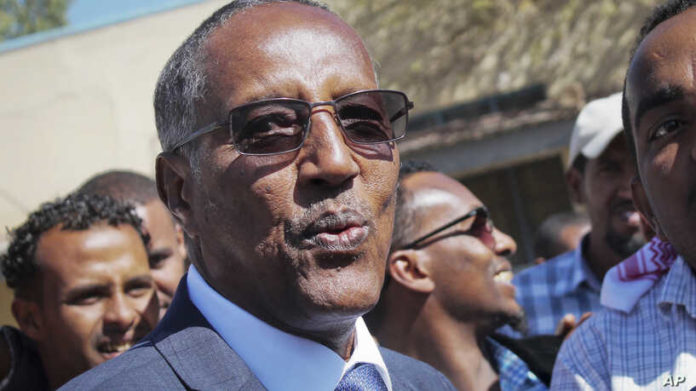
Somaliland President Muse Bihi Abdi says authorities in Mogadishu pose the biggest challenge for the autonomous region’s fight for recognition as an independent state, 29 years after the region broke away from Somalia after the overthrow of military ruler Siad Barre.
In an exclusive interview with VOA’s Somalia service that aired Saturday, Bihi called on the international community to recognize Somaliland’s independence, saying the only solution for Somaliland is for Somalia’s leadership and the international community to accept “the reality of two independent nations.”
“Since Somaliland announced its independence from Somalia, we have done everything that we could to earn a recognition. We rule in democracy, we have peaceful and functioning institutions, and economically we are not a burden to the world, yet we have no recognition and did not see anyone saying we do not deserve it,” Bihi said.
Broke away in 1991
Somaliland, a former British protectorate, broke away from Somalia in 1991 and has continued its effort to be a separate country ever since, but it has not been internationally recognized.
The government in Mogadishu, however, wants the country’s northern territory to be part of a single Somali state.
“We face the biggest fight from the government in Mogadishu, which uses its international recognition and support to fight Somaliland, whether it is economic pressure, instigating violence within Somaliland or spreading a propaganda war,” Bihi said.
Unlike the southern part of Somalia, Somaliland has had relative peace for 29 years, but it is often accused by rights organizations of making arbitrary arrests and being tough against journalists.
“We do not arrest anyone without court trials or due process. We rule in democracy where the rights of our people are respected.” If the incidents alleged by rights groups happen, “it is a mistake and we are ready to correct it,” Bihi said.
Female singers and journalists are among people still in Somaliland jails.
After VOA Somali aired Bihi’s interview, detained journalist Abdimalik Muse Oldon, who was arrested in April 2019, was released in Hargeisa. The journalist told VOA he was let go with a presidential pardon.
Somalia-Somaliland talks
Strong positions on both sides — separation versus unity, enshrined in each of their constitutions — and the lack of compromise have made negotiating Somaliland’s independence an insurmountable task.
In June 2012, however, delegates from the two sides held their first formal talks in London, which ended with no progress. Then, Turkey mediated another round of talks, which stalled.
The European Union has been pushing for the resumption of the talks, but most recently, in February 2020, Bihi and Somali President Mohamed Abdullahi Mohamed met in the Ethiopian capital, Addis Ababa, for the first major face-to-face talks between the leaders.
“In our recent meeting in Addis Ababa, we have agreed to continue talks and end our issues through talks, but we still need impartial international mediation,” Bihi said in the VOA interview.
In Mogadishu, delivering a speech that was briefly interrupted by loud whistling, boos and hisses, Abdullahi also said Mogadishu was ready for talks.
“President Bihi of Somaliland had accepted our talks to be resumed and I hope we will solve everything through peaceful and consensus means,” Somalia’s president said.
Protests
Members of parliament who interrupted the president’s speech were protesting the government’s failure to address promises made, including security, and proper preparations for the upcoming elections.
The president reaffirmed in his speech that Somalia’s elections would not be delayed.
Somaliland, has not been part of Somali elections since its independence declaration and has its own electoral system.
VOA





































